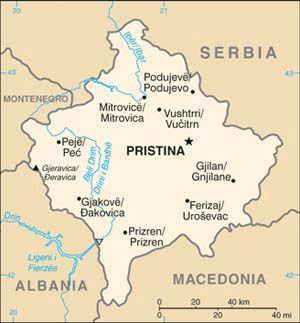Kosovo’s Fatmir Limaj Back In Detention
By Fatmir Aliu
The former Kosovo Liberation Army, KLA, commander Fatmir Limaj, has been placed in detention for a month, an international judge ruled on Saturday.
Limaj and three other ex KLA, fighters, Naser Krasniqi, Nexhmi Krasniqi and Naser Shala, who were accused of war crimes, appeared over the weekend at Pristina’s District Court, where they were ordered to one month detention on remand.

“The risk of flight and the risk of tampering with evidence existed in respect of all accused in view of the fact they were charged with very serious alleged criminal offences,” EULEX said in a press release.
Kosovo’s Prime Minister Hashim Thaci has described Limaj’s detention as unacceptable and unjust and as a sly act by EULEX.
Speaking at the ceremony marking the Kosovo Security Forces day in Pristina, Thaci said that no one has the right to make “secret” arrests without the knowledge of the local institutions.
“This is unfair! This is unacceptable! This is shameful! This is not justice, this is indignity,” Thaci said during the ceremony aired live by Kosovo’s public broadcaster on Monday afternoon.
The four men were acquitted on May 2 on all charges of war crimes committed during the Kosovo war, but the prosecution appealed the verdict and on November 20 the case was sent to a retrial.
According to the indictment the defendants had “violated the bodily integrity and health of an unspecified number of Serb and Albanian civilians and Serb prisoners of war held in a detention centre in the village of Klecka.”
Almost all of the charges were based on the testimony of Agim Zogaj, known as Witness X, who killed himself last September in Germany, before the first trial started.
Zogaj was a prison guard at the Klecka prison and his diary about events there was crucial to the prosecution’s case but on March 21, the court found that his testimony and diaries were inadmissible.
However, last week the EULEX judge, Gerrit-Marc Sprenger, overruled that decision, making Zogaj’s testimonies admissible.
Limaj’s former soldiers from the KLA’s 121st Brigade “Kumanova” have announced a protest in the village of Gjurgjice in Malisheva, on Tuesday morning during the inauguration of the new section of the Pristina-Vermice highway.
In a press release issued on Sunday, they called for Limaj’s immediate release and said they are “deeply disappointed” with Kosovo’s justice system and accused EULEX of bias.
The EU Special Representative to Kosovo, Samuel Zbogar, said on Monday that he understands the sensitivities and emotions surrounding Limaj’s arrest and called for non-inference in the judicial processes.
“A fundamental principle of any modern, democratic society is non-interference in the judicial process. Judges act independently, prosecutors act autonomously and those indicted are innocent until proven guilty. Decisions by EULEX prosecutors and judges have never been, are not and will never be politically motivated,” he said
Limaj, the Vice President of the ruling Democratic Party of Kosovo, also faced war crime charges at the Hague Tribunal, ICTY.
He was charged, along with Isak Musliu and Haradin Bala, with war crimes against Serbs and Albanians suspected of collaborating with Serbia during the Kosovo war.
In November 2005, the ICTY acquitted him and he returned home to a hero’s welcome.
On November 16 this year, EULEX has indicted Limaj for organized crime and corruption during his time as the Minister of Transport, between 2008 and 2010.
